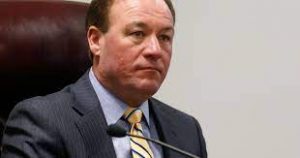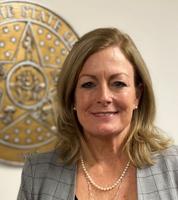
It would appear the transparency that Oklahoma legislators have emphasized in recent years might be on its way to being a victim of efficiency.
The Oklahoma House voted Thursday in support of Ardmore Rep. Tammy Townley’s HB2367, the Oklahoma Corporation Commission Efficiency Act. The vote was 54-32 to grant the Oklahoma Corporation Commissioners exemptions for 11 various kinds of meetings without notifying the public. In other words, they will be able to meet behind closed doors and handle certain administrative matters, and even make informal agreements on issues without the knowledge of the public.
“This is a request bill from the Oklahoma Corporation Commission,” explained Rep. Townley on the floor of the House, but not admitting that one Commissioner, Bob Anthony, had taken a strong public stand against her bill.
Her measure was amended to include a sunset provision on its enforcement.
“The provisions of this section shall cease to have the force and
effect of law on July 1, 2026.”
At a Feb. 20 special meeting of the Corporation Commission, Chairman Todd Hiett confirmed he requested the bill after working for several years with the Oklahoma Press Association to create such a measure.

“I would like to take one more stab at it to get it across the finish line,” said Hiett last month. The current law, he stated, “creates a situation with a 3-member board that is just untenable much of the time. This bill would open the door to allow for a joint briefing provided that the commissioners are not taking any action. It would add efficiency to our ability to operate the agency.”
The commission took a vote on Feb. 20 whether to support Rep. Townley’s bill. HB2367 had the support of Hiett and Commissioner Kim David while Commissioner Bob Anthony said he would not participate in the vote.
“This was one to make the Oklahoma Corporation Commission more efficient,” added Townley in the Thursday morning House vote.
Under her bill, the commissioners would be able to meet and discuss in 11 different situations.
“And if they do, they must post it to the website within 48 hours.”
No questions were raised about “transparency” or the need of public knowledge of when the Commissioners might be able to gather informally and make agreements.
Tulsa Rep. Melissa Provenzano raised a question about the 11 different situations cited in the bill, to which Rep. Townley explained again, “They’re able to talk among themselves, but if they do, they must post it to the website.”
Rep. Suzanne Schreiber of Tulsa raised a question about the executive session tool, something which the Corporation Commission cannot do.
“They cannot discuss legislative rate changing or rule changing without it going before open meetings,” continued Townley.
Only one other legislator bothered to raise a question and that came from Rep. John Pfeiffer about the sunset provision of the bill.
Within weeks after Corporation Commissioners Hiett and David, who are both former legislative leaders, voted to endorse the measure in February, Commissioner Anthony came out against the bill as reported by OK Energy Today. His viewpoint was repeated in the Sunday edition of the Oklahoman newspaper.
During the Feb. 20 special meeting, Hiett and David complained how they were restricted from being able to discuss certain matters like they were when he served as Speaker of the House and she as a Senate leader.

David said under HB2367, the commissioners could have more “brainstorming” and later during the public meeting offer a better explanation of their votes.
“We do our best to remain transparent—the language in the bill met those requirements that we have disclosure about what the communication was and put it in the website,” she commented, adding she thinks if the bill becomes law, there will be more transparency than currently exists.
A similar effort was attempted last month in the Kansas Legislature until Manhattan Rep. Kenny Titus convinced fellow House members to switch their votes and kill the bill. He told them the bill was a “dangerous precedent” and that the Kansas Corporation Commission “deserves more—not less–transparency.”
““I fear that once transparency protections are removed this body will find it exceedingly difficult to restore them. The structure and function of the KCC may well need to be revamped, but exempting their most important work from the open meetings act is not an appropriate solution.”
Vote switching began and when the votes were finalized, the bill was killed 38-82.
Unlike Oklahoma where the Oklahoma Press Association worked with Hiett and others to create the bill, the Kansas effort was opposed by the state’s two main press organizations, the Kansas Press Association and the Kansas Association of Broadcasters. Emily Bradbury with the KPA said the bill should have been killed because unless the bill’s proponents could establish “the very tall task of articulating a substantial government interest that outweighs the public’s right to be informed under KOMA.”
In her opinion, supporters of the bill could not accomplish it.
In Oklahoma, FOI Oklahoma, another press group did not oppose the bill to allow the Corporation Commissioners to meet without informing the public.




